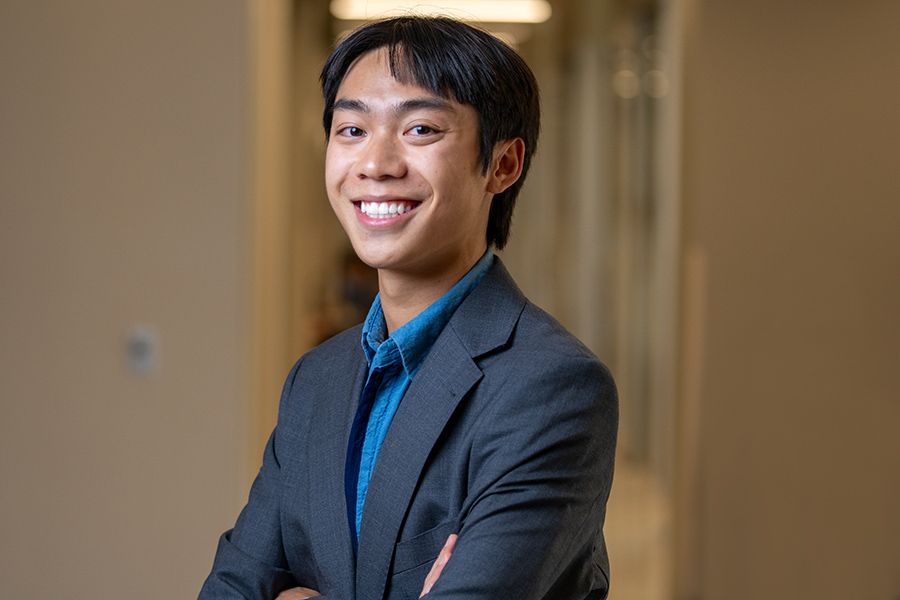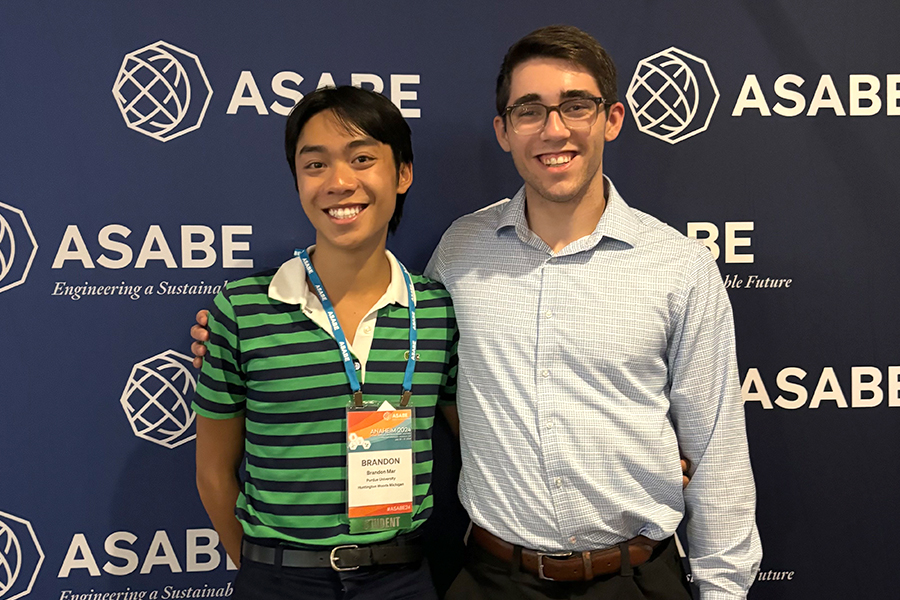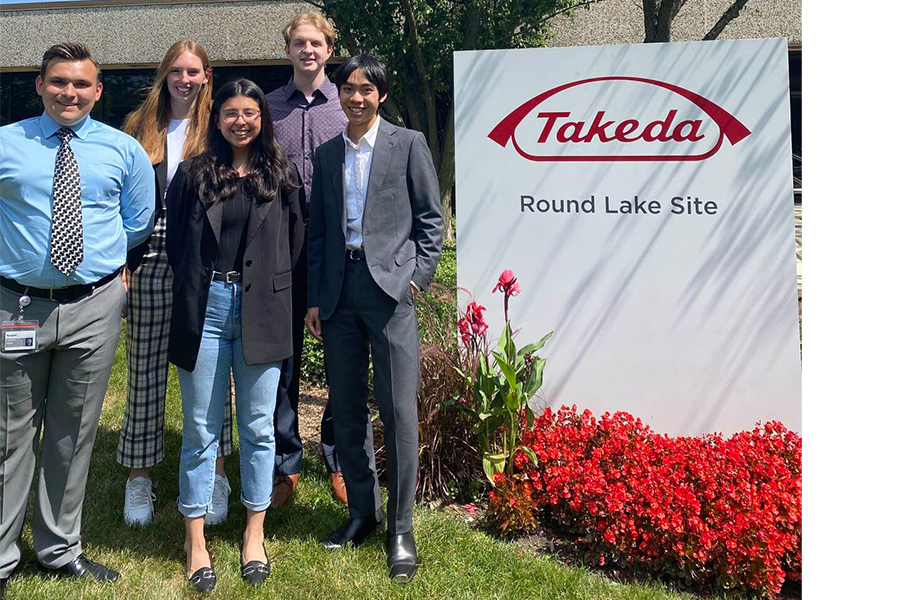Mentoring, goal setting spurred Engineering Fellow, ABE student Mar toward success
Brandon Mar, a senior in agricultural and biological engineering, was honored as one of seven Purdue Engineering Fellows in September 2024.

"What if everything changed?"
Brandon Mar asked that critical question, admiring the wall of Purdue Engineering Fellows’ portraits in the Neil Armstrong Hall of Engineering. The question that the first-year student should have been asking that September in 2021 was, admittedly, if he would succeed enough in First-Year Engineering to transition into a major. He remembers that first semester as a “circus” full of new friends and club meetings, but, ultimately, it was “tumultuous” and an academic struggle.
The wall of Engineering Fellows sparked the wake-up call that Mar needed. He knew he could become one if he made some changes, and even with a semester of poor grades, social parties and meetings instead of class, Mar wondered if he could still pull it off.
Fellows were praised as advocates of the student experience, impactful leaders, supportive mentors and devoted researchers, bettering Purdue and the world around them with their work and presence. Mar wanted to become one, too.
So Mar set goals — to study more effectively, to ask questions, to find leadership roles and devote himself to the research he loved — and mastered the art of saying “no,” making a schedule and sticking to it.
In September 2024, Mar was one of seven seniors named a Purdue Engineering Fellow. He was the only agricultural and biological engineering (ABE) student of the group.
“Brandon is a highly exceptional sought-after student who makes a positive impact,” wrote Department of Agricultural and Biological Engineering senior academic advisor, Laurie Snyder, in a nomination letter. “He is a caring, passionate, energetic and positive person.”
Intersection makes connection
Originally from the metropolitan suburbs of Detroit, Mar sought out friends and colleagues with a variety of life experiences and identities. His gregarious nature and supportive, enthusiastic attitude made him a natural leader with a keen eye for the outsider. A mosaic of friends and communities dotted Mar’s early experiences at Purdue.
“I definitely have some intersecting identities that make me who I am,” Mar said. “I knew what it was like to be an underclassman. I did it and had a rockier start, at least academically. I try to be as helpful as I can there.”
Mar’s experiences of academic struggle and an overwhelming social life gave him fodder to connect with other students, most notably curious first-years looking for community. His own itch to find an organization to call home led him to Purdue Medical Innovation, Networking and Design (MIND), which focuses on increasing the technical skills of its members. Not long after he joined in 2022, Mar began contributing ideas to expand the organization’s focus. He became a design and development team member, then joined the executive board as secretary in the spring of 2023.
His question, “What if everything changed?” resonated through his leadership and mentorship, especially as he worked to include first-year students and a variety of engineering disciplines and job skills in MIND’s membership.
MIND’s faculty advisor, Aaron Lottes, worked closely with Mar after he became MIND’s co-president in 2023.
“Brandon has worked to involve a diverse set of engineering disciplines (in MIND) and encourages and welcomes FYE students to contribute to solving medical problems and developing solutions,” Lottes, a professor of engineering practice in the Weldon School of Biomedical Engineering, wrote in his nomination letter for Mar. “His involvement of engineering students early in their time at Purdue provides encouragement, motivation and belonging.”
In the year of Mar’s leadership, the 25-member organization surpassed 60 members, a spectacular increase alongside the widening variety of skills MIND members could practice. The ABE senior’s skill for maintaining an open dialogue with members maximized the value that MIND could provide in both technical and soft skills, like team management and conflict resolution.
"What just happened?"
Mar’s remarkable ability to connect with and engage first-year engineering students also made him a great fit for leadership in the American Society of Agricultural and Biological Engineers (ASABE). When he joined ASABE in 2022, he was one of two new members who were not part of the leadership team. But by the following year, Mar was president and working tirelessly to bring new life to the chapter.
Mar “reinvigorated the chapter, developing a professional development program that included outside speakers (often alumni) and visits to local businesses that employ engineers,” ABE head Nathan Mosier wrote in a Fellows nomination letter. Like in MIND, Mar’s efforts to include a range of engineering disciplines and companies “led to (ASABE) students gaining a wider appreciation for the breadth of interests and skills embodied by our department.”

“It wasn’t just (the leadership team),” Mar said, “ABE wanted us to have a great student chapter as well.”
Membership more than tripled during Mar’s term. The chapter’s sudden growth and increase in on-campus activity led to an invitation to the ASABE national conference, which Mar attended alongside current ASABE president Hudson Schneider, the other non-leadership student to join ASABE in 2022. The two representatives came home with a Midwest regional prize.
“I was in the car with Hudson, driving back. We were like, ‘How did this happen?’ We were laughing,” Mar said. “Other groups showed up with tons of students to this rally, and it was just him and I and we won the big award. And it sunk in that every week we’re putting all this time into growing and making sure our peers are feeling supported.”
Support through mentorship played a large part in Mar’s journey as a student, even when he didn’t recognize his own mentors’ help. Mar’s goal to lead meant he sought out opportunities to mentor and “pass the ladder down” to younger students.
“I got help getting into laboratories from people I know, and now I’ve recommended more than 10 students in the labs I work in,” Mar said. “It’s a cycle of reciprocity.”
The benefits did not come without hard work, especially within the three lab settings he has worked in. Mar gave his all to leading, mentoring and his classes, even after a beginning filled with substantial academic struggle. This shift showcased Mar’s “ever-present, ever-curious” demeanor “and always with a cheerful determination to do his best,” as Mosier wrote in his recommendation. “Brandon is one of the hardest working students in our biological engineering program. He was eager to participate in class discussions and was a leader of his team on the lab projects for the course.”
What works is teamwork
While in labs, Mar took part in drug development experiments in Low lab and bacteriophage investigations in ABE professor Kari Clase’s lab, where he found his passion for pharmacology, the study of drugs’ components, history, uses, chemical properties and impacts on a living organism’s body.
“Seeing a drug we made work was exciting. For a minute you’re like, ‘How did this happen?’ But we have this amazing team of scientists. The postdoc I work with, Ramesh Mukkamala, has dedicated years of his time to this project. That’s how that happened. I was kind of struck by that, that we’re all here and working hard every day to make these drugs work.”
Every university Mar had applied for was for engineering. As a senior, he is excited to part with traditional engineering to apply it to pharmacology and drug discovery and use the $25,000 gift supplied by Robert H. Buckman (BSChE ’59) and wife Joyce A. Mollerup to supplement continuing studies.
“I’m really happy with the education and the training I’ve gotten here in engineering,” Mar said. “It’s been extraordinarily useful in my path up to now.”
